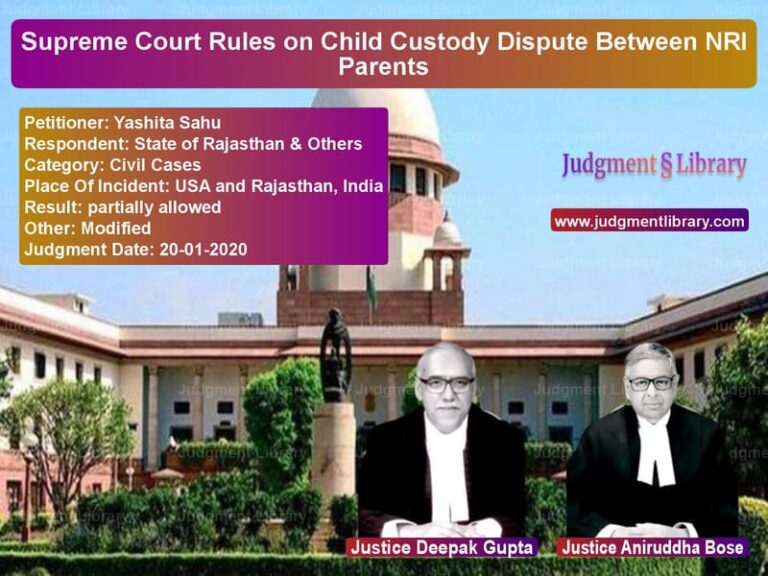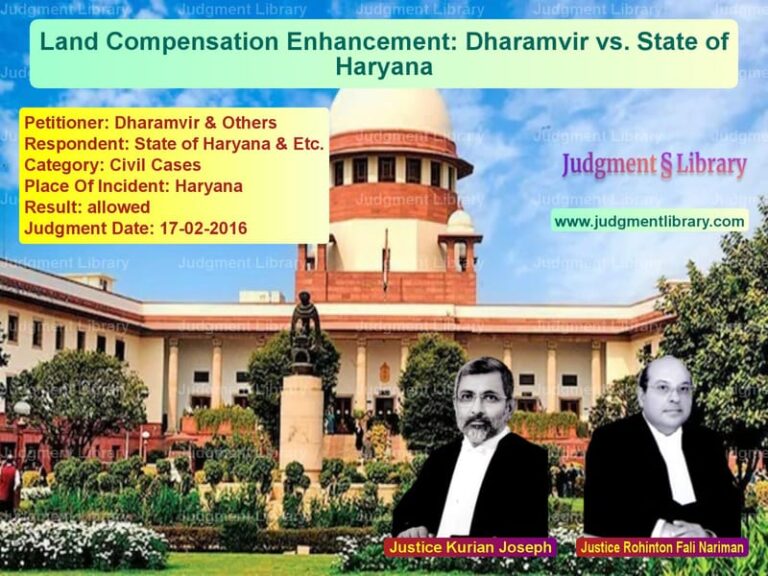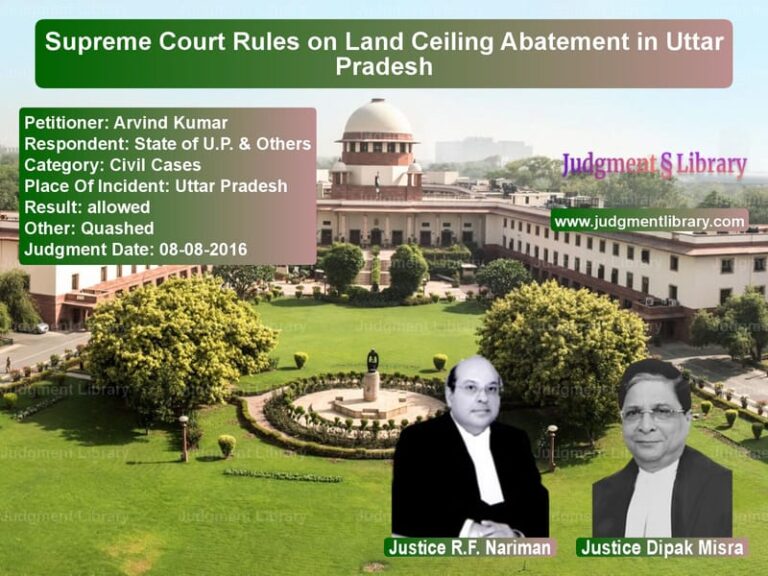Wound Fatality and Section 304 Part II: Supreme Court Judgment in Raju Ambadas Gangekar vs. State of Maharashtra
The case of Raju Ambadas Gangekar vs. State of Maharashtra revolves around the death of Captain Vinod Rawat, who was assaulted by the appellant and his associates in a hotel in Ahmednagar. The victim, a Captain in the Indian Army, suffered grievous injuries during an altercation in which chilly powder was thrown into his eyes, followed by a violent assault. This case centers on the legal determination of the severity of the crime, whether it constituted murder (Section 302 IPC) or culpable homicide not amounting to murder (Section 304 Part II IPC).
The appellant, Raju Ambadas Gangekar, was initially acquitted by the trial court, but the Bombay High Court reversed the acquittal and convicted him under Section 304 Part II of the Indian Penal Code (IPC), sentencing him to five years of rigorous imprisonment. The appellant appealed this decision to the Supreme Court, which examined the material evidence, including the dying declaration, witness testimonies, and the circumstances surrounding the incident.
Background of the Case
The incident occurred on the night of 10 July 1988 at New Jagdamba Hotel in Ahmednagar. The deceased, Captain Vinod Rawat, and his colleague Lieutenant Melvin Desouza visited the hotel, where a quarrel broke out with the accused. The dispute escalated when chilly powder was thrown at the two military personnel. The deceased and his colleague fled the scene, but they were chased and assaulted. The appellant allegedly assaulted the victim with a gupti, a type of knife, causing fatal injuries. The appellant was arrested and later convicted by the High Court for causing death under Section 304 Part II IPC.
Arguments by the Appellant (Raju Ambadas Gangekar)
The appellant’s counsel, Mr. Sushil Karanjkar, argued that:
- The trial court had acquitted the appellant, and the High Court erred in reversing that decision based on insufficient evidence.
- There were discrepancies in the investigation, including failure to produce certain key witnesses and perform essential identifications.
- The dying declaration (Exh. 21) made by the victim was unreliable and should not have been relied upon to convict the appellant.
- The evidence presented by the prosecution was weak and based on conjecture, and the High Court should not have interfered with the trial court’s judgment of acquittal.
Arguments by the Respondent (State of Maharashtra)
The respondent, represented by Mr. Nishant Ramakantrao Katneshwarkar, argued that:
- The trial court had failed to appreciate the material evidence, including the dying declaration and the witness testimonies that established the appellant’s involvement in the assault.
- The dying declaration, recorded at the hospital, identified the appellant and described the circumstances of the assault, making it a crucial piece of evidence in the case.
- The appellant’s arrest and the recovery of blood-stained clothes further corroborated the testimony of the beat constable, PW-13, who witnessed the assault.
- The High Court correctly reversed the trial court’s acquittal, as the trial court had overlooked key aspects of the evidence that supported the appellant’s guilt.
Supreme Court’s Observations and Judgment
The Supreme Court reviewed the entire evidence, focusing on the dying declaration, the testimony of the beat constable (PW-13), and the recovery of blood-stained clothes. The Court reiterated the established principles regarding the reversal of acquittals by appellate courts, particularly in cases of serious offenses such as homicide. The Court emphasized that the appellate court can reverse an acquittal if it finds the trial court’s judgment to be perverse or manifestly unjust.
The Court made the following observations:
“The appellate court has full power to review, reconsider, and reappreciate the evidence, and it may reverse the acquittal if the trial court has not properly evaluated the evidence or has committed a grave error in law.”
The Court also acknowledged the significance of the dying declaration, stating:
“The dying declaration made by the victim is an important piece of evidence that has been corroborated by the beat constable and the medical officer. The details provided in the dying declaration regarding the assailant’s identity and the weapon used were specific and credible.”
Final Judgment
The Supreme Court dismissed the appellant’s appeal and upheld the decision of the Bombay High Court. The Court found that the High Court had rightly reversed the trial court’s acquittal and convicted the appellant under Section 304 Part II of the IPC for culpable homicide not amounting to murder. The Court held:
“The High Court’s decision is based on a thorough evaluation of the evidence. The appellant’s conviction under Section 304 Part II of the IPC is upheld, and the sentence of five years of rigorous imprisonment is appropriate given the nature of the offense.”
The Court concluded that the appellant had intentionally caused the victim’s death and that the case did not meet the criteria for murder under Section 302 IPC. The sentence imposed by the High Court was affirmed.
Conclusion
The judgment in this case clarifies the principles of appellate review in criminal cases, particularly in cases where the trial court has acquitted the accused. It highlights the significance of dying declarations as evidence and the role of appellate courts in ensuring that justice is served, even if it involves reversing a trial court’s acquittal. The case serves as an important reminder of the rigorous standards required for the conviction of individuals involved in serious offenses such as homicide.
Petitioner Name: Raju Ambadas Gangekar.Respondent Name: State of Maharashtra.Judgment By: Justice Dhananjaya Y. Chandrachud, Justice Hemant Gupta.Place Of Incident: Maharashtra.Judgment Date: 24-01-2019.
Don’t miss out on the full details! Download the complete judgment in PDF format below and gain valuable insights instantly!
Download Judgment: Raju Ambadas Gangeka vs State of Maharashtra Supreme Court of India Judgment Dated 24-01-2019.pdf
Direct Downlaod Judgment: Direct downlaod this Judgment
See all petitions in Murder Cases
See all petitions in Fraud and Forgery
See all petitions in Custodial Deaths and Police Misconduct
See all petitions in Judgment by Dhananjaya Y Chandrachud
See all petitions in Judgment by Hemant Gupta
See all petitions in dismissed
See all petitions in supreme court of India judgments January 2019
See all petitions in 2019 judgments
See all posts in Criminal Cases Category
See all allowed petitions in Criminal Cases Category
See all Dismissed petitions in Criminal Cases Category
See all partially allowed petitions in Criminal Cases Category







